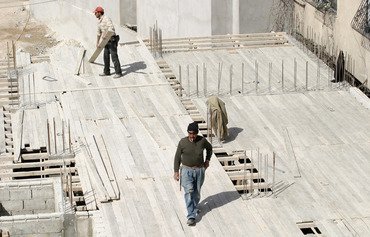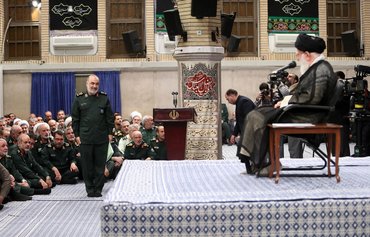Signs that a deal allowing companies affiliated with Iran's Islamic Revolutionary Guard Corps (IRGC) to operate Syria's third cellular telecommunication network is set to go ahead have raised concern in some circles.
This is because the move has serious implications for the Syrian economy, which Iran is trying to control, and also gives Iran a platform for spying and surveillance activities, Syrian lawyer Bashar al-Bassam told Diyaruna.
By establishing a stake in this sector, he said, Iran will be able to eavesdrop on and manipulate telecommunications, as well as impose operating conditions that suit its own agenda with regard to pursuing its opponents.
Earlier this month, Syrian Minister of Communications and Technology Iyad al-Khatib told parliament the government was working with an Iranian company to establish and operate a third cellular telecommunications network in Syria.
![A Syrian regime telecommunications centre in Damascus. [Photo circulated on social media]](/cnmi_di/images/2019/02/26/16898-Syrian-telecommunications-centre-600_384.jpg)
A Syrian regime telecommunications centre in Damascus. [Photo circulated on social media]
This intention had been announced twice before, in 2016 and 2017, during talks on trade and economic agreements between Iran and Syria, al-Bassam said.
But the deal now has been confirmed, activated and awarded directly to a company affiliated with the IRGC, he said.
"A Syrian company will serve as a front, since Syrian law requires that cellular network operators be Syrian, but the company’s capital is Iranian and so are the companies that will operate the new network," he said.
The new network will be overseen by the Mobile Telecommunications Company of Iran, which is owned by a consortium that includes at least two companies affiliated with the IRGC.
Expanded Iranian influence
"The deal is one of a series of moves by Iran to control the Syrian economy," al-Bassam said, noting that Iran already has a grip on several sectors.
Al-Alam TV-Syria, an Iran-funded satellite channel that began broadcasting in Syria in November 2017, enables Iran to promote its agenda and ideologies.
Establishing control of a segment of the telecommunications sector will enable Iran to engage in spying activities and monitor its opponents in the region -- as it already does internally, he said.
In 2013 sanctions designating Iran Electronics Industries (IEI), the US Treasury noted that the company offered a number of goods and services related to jamming, monitoring and eavesdropping.
"Satellite jamming is a pervasive reality in Iran. It is used to censor free speech and prohibit access to information through deliberate interference for the express purpose of preventing access to specific content," the Treasury said.
"Orbital and terrestrial jamming is frequently used in Iran to prevent access to specific news and information broadcast from abroad," it said, noting that this has been used to block, jam or interfere with communications such as cell phone calls, text messages, GPS systems, and Wi-Fi networks.
Iran's surveillance activities
"As of 2011, the Iranian government has been able to monitor text-messaging services via a monitoring system installed by IEI," the Treasury said.
"In the context of their use by the government of Iran, monitoring and eavesdropping form an integral part of the Iranian regime’s effort to control and limit content and suppress speech," it added.
In addition to monitoring online activity, the Treasury said, "Iranian authorities routinely use surveillance to round up and interrogate political activists".
An Iranian protester who took part in anti-government demonstrations in late 2017 and early 2018 accused the authorities of openly and publicly trying to cut off communication "any time they detect any kind of opposition".
They do this by cutting off Internet services or by weakening them to the point of being ineffective, the protester told Diyaruna's sister site Al-Mashareq at the time, adding that the main social media platforms are regularly blocked.
By installing cell towers and antennae throughout Syria, Iran will be able to manipulate internet services and monitor social media in that country as well, al-Bassam noted.
He said the Mobile Telecommunications Company of Iran will "undoubtedly enter the Syrian market with force to compete with the two existing companies".
By offering competitive prices, it will be able to quickly expand, he added.

![Syriatel, the first mobile telecommunications company in Syria, will face competition from a new Iran-controlled network in the country. [Photo circulated on social media]](/cnmi_di/images/2019/02/26/16897-Syriatel-mobile-showroom-600_384.jpg)






